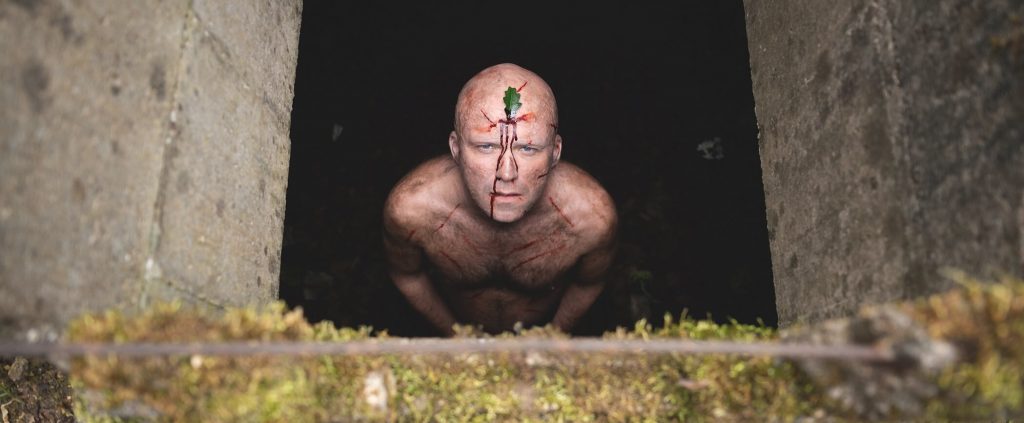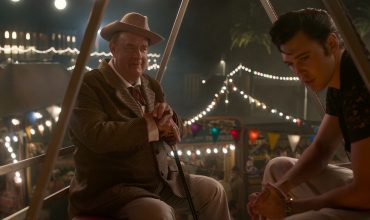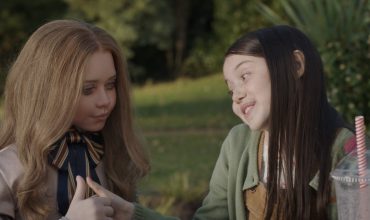Alex Garland brings two of the most talented actors of modern cinema and theatre together, stacks the odds against one of them and gaslights an entire viewership in the process in Men, a gorgeously absurd new film that ponders the question: if a strange bloke turns up naked at your house but doesn’t actually get inside, has any harm been done? Garland takes a different approach at highlighting the attributes of #allmen to their almost total omission from his previous genre outing, with results that will infuriate some and validate others. Men (much like the species to which it refers) will test your patience but ultimately, there’s value to be found beneath the surface – if one only cares to look.
Jessie Buckley is Harper, a woman who (by means I won’t spoil) just got out of a horribly toxic marriage. Having watched Escape to the Country or perhaps the first third of Hot Fuzz, Harper decides that a rural retreat is just what she needs to escape the bad memories associated with her former partner, so she packs her bags into her blue Fiesta and heads to the most sparsely populated village she can find, Airbnbing an enormous heritage house from the endearingly toothy, British landlord Geoffrey (Rory Kinnear). What was meant to be an empowering solo trip of healing and long walks in the countryside turns into a folk horror nightmare as Harper finds that ghosts can leave London and country men are no better than their city counterparts (they might even be worse).
On one such walk in the grounds bordering her lodgings, Harper discovers a tunnel, abandoned and stretching outwards into the darkness. An overtly feminine, cavernous space, Harper entertains herself with a self-made symphony in its literal echo chamber. Memories of my spirited music teacher came flooding back – a woman who managed to conduct untalented 9-year-olds in harmonies we’d never again hear outside the classroom – and settled in the face of the brown-eyed woman who could be her junior. She is childlike in this moment and it’s the only point in the film where we see her forget herself and her difficult history, a moment all too fleeting as a figure at the end of the tunnel awakens and starts to run in her direction.
Men is a fever dream of Biblical proportions that at times feels unfocused but nevertheless, presents an unapologetic image of the questionable behaviour that half of our population have coded in their history. References to Eden abound in the large apple tree in Harper’s rented courtyard and the perpetually naked man who seems to think he lives there, and in Geoffrey, who warns Harper that she has overstepped her boundaries when she plucks an apple upon arrival, before laughing it off with a characteristically British guffaw. But Harper’s sense of entitlement to a piece of fruit pales in comparison to that of each and every man she meets, and each and every man she meets is played by Kinnear.
Much like Darren Aronofsky’s pessimistic creation myth exploring religion and a certain toxic man’s place within it, Men blends Christian and pre-Christian patriarchal themes with an outrage that lends itself to a particular brand of dark comedy. It’s present in the local vicar, low-key blaming Harper for pushing her former husband into abusing her as he slyly gropes her thigh under the guise of sympathy. Or the teenager with the cutesy costume mask (and the uncanny valley face underneath) who asks her to play games with him before calling her a “stupid bitch”. Could the answer to male entitlement and wrath be as simple as a long-held grudge over a stolen rib?

Perfectly normal behaviour from Rory Kinnear.
Religious symbolism and the initial suggestion of Adam fall away as a more primordial figure presents himself in the form of the Green Man. Antagonist-come-mentor to Sir Gawain in David Lowery’s (and an unknown poet’s) The Green Knight, that eponymous hero shares traits with and is likely inspired by this most vegetative of deities whose true agenda remains debated. Like the faun who sets Ofelia three monstrous tasks in Pan’s Labyrinth, perhaps old Greeny is a distraction in Harper’s healing process. While the other Rory Kinnears run at her, sticking their hands through her mail slot and barging their way into the house, Green Man is slow and non-aggressive in his approach. He’s unwelcomely starkers one hundred percent of the time, but I’d take a flaccid, forest-faced intruder over a dead-eyed, sprinting policeman any day of the week.
The gentleness of Harper’s most persistent stalker makes the batshit final minutes of Men that much more disturbing – and a true test of patience for its audience. If you’ve seen the opening of the experimental Begotten (and that’s all I’ve seen, as one ever so slightly put off by the suicidal hacking away at innards with a straight razor), you’ll be better prepared than most for the repetitive discomfort of Men’s third act. A biological display of the regenerative cycle of toxic masculinity, Garland uses the allegory (emphasis on gory) of childbirth to punish his viewers in much the same way we were punished by sadistic human biology teachers who enjoyed watching students squirm. Few filmmakers would have the guts to envision such a sequence, let alone show it to acclaimed actors and ask them to take part. Thanks be to the films’ stars, who were mad enough to say yes.
Men’s subjective success is largely down to three elements, the first of which being the excellent performances of its tiny cast. Jessie Buckley, despite playing a character defined by her odd haircut and something that happened to her, feels like a real person reacting appropriately to the events unfolding around her. Able to convey the tiniest but most recognisable emotions on her face, she’s a person with whom it’s impossible not to empathise. Rory Kinnear has the task and the privilege of multiple roles and he falls into each of them with the ease of a hundred apples creepily dropping from a tree all at once. The other three Penny Dreadful fans out there already knew of his gift, but Men should ensure that we see his face(s) more often.
With cinematography by Rob Hardy, known for Garland’s previous work and the most sexually-charged bathroom scene in recent years, his vibrant and disconcerting Eden is a stunning creation. The atmosphere borders on fantasy and Harper’s strange surroundings could be relics of Annihilation‘s shimmer, replacing screaming bears with something more mundane but arguably more dangerous. The outstanding visuals are complemented by a score of haunting choir pieces that perfectly encapsulate Harper’s inner torment and outer silence, from frequent Garland collaborators Ben Salisbury and Geoff Barrow (of this Most Played sleepy time track).
Whether you’re moved by Men may depend on a) your life experiences and ability to empathise, like the woman behind me who quietly sobbed at an early scene depicting Harper’s ex-husband snatching her phone and proving her actions in seeking help from “that bitch” (her best friend) correct, and b) your tolerance for aggressively unsubtle metaphors, like the mother! lover in me that revels in delicious anger and disregard for audience comfort levels (including my own). Similarities in tone and themes to Aronofsky’s polarising affair are abundant and there’s a strong chance that those who saw little value in that film will find even less here. But what have you got to lose (other than an hour and forty of your terribly exciting life)? All in all, I rate Men the same score that I rate men – 7/10.
Men is in cinemas June 16 – maybe don’t take your dad.


